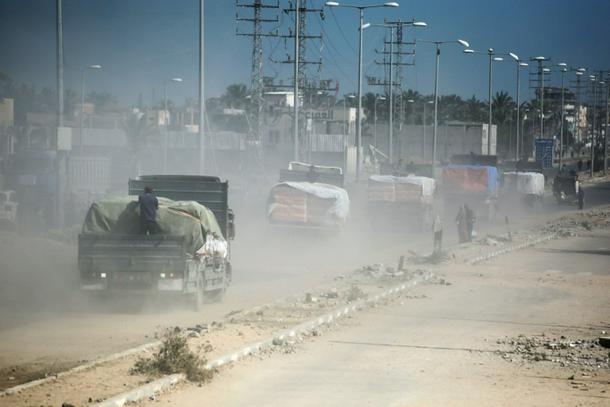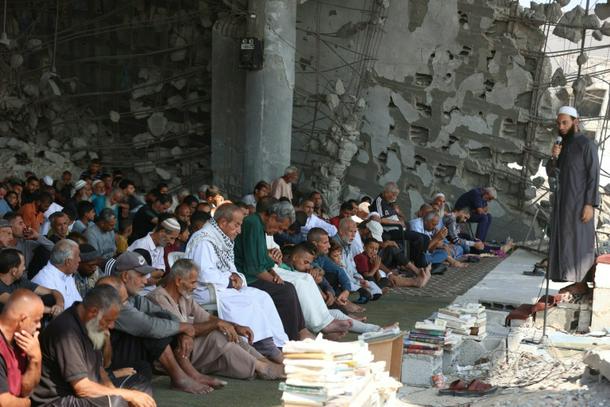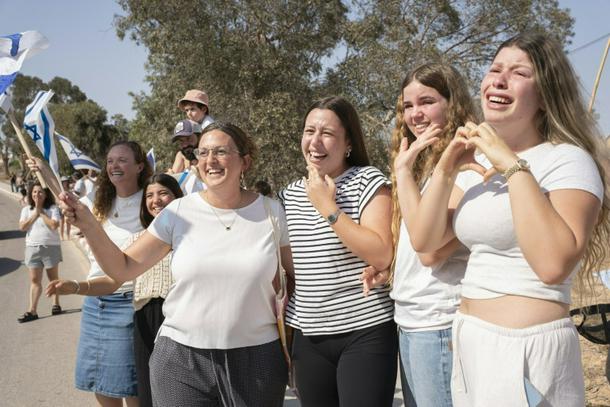
Aid trucks are now arriving in number in Gaza via two Israeli checkpoints but the UN is pushing for the Rafah crossing to Egypt to also be opened
Jerusalem (AFP) - The United Nations’ aid chief took stock of the monumental task of restoring dignity and hygiene to Palestinians clinging to life in Gaza’s ruins on Saturday, as Israel and Hamas exchanged more bodies.
A convoy of white UN jeeps carried relief coordinator Tom Fletcher and his team through the twisted rubble of shattered homes to see a wastewater treatment plant in Sheikh Radwan, north of Gaza City.
“I drove through here seven to eight months ago when most of these buildings were still standing and, to see the devastation – this is a vast part of the city, just a wasteland – and it’s absolutely devastating to see,” he told AFP.
The densely populated cities of the Gaza Strip, home to more than two million Palestinians, have largely been reduced to ruins by two years of bombardment and intense fighting between Hamas and the Israeli army.
Just over a week since US President Donald Trump helped broker a truce, the main border crossing to Egypt has yet to be reopened, but hundreds of trucks roll in daily via Israeli checkpoints and aid is being distributed.
Hamas has returned the final 20 surviving hostages it was holding and has begun to hand over the remains of another 28 who died.
On Friday night, it turned over a body identified by Israel as Eliyahu Margalit, 75, who died in the October 7, 2023 attack that ignited the war in Gaza.
On Saturday, in line with the terms of the ceasefire deal, Israel returned the bodies of 15 more Palestinians to Gaza, the health ministry in the Hamas-run territory said.
- Digging latrines -
Surveying the damaged pumping equipment and a grim lake of sewage at the Sheikh Radwan wastewater plant, Fletcher said the task ahead for the UN and aid agencies was a “massive, massive job”.
The British diplomat said he had met residents returning to destroyed homes trying to dig latrines in the ruins.

Palestinian Muslims took part in Friday prayers this week despite many of their mosques being redcued to rubble
“They’re telling me most of all they want dignity,” he said. “We’ve got to get the power back on so we can start to get the sanitation system back in place.
“We have a massive 60-day plan now to surge in food, get a million meals out there a day, start to rebuild the health sector, bring in tents for the winter, get hundreds of thousands of kids back into school.”
According to figures supplied to mediators by the Israeli military’s civil affairs agency and released by the UN humanitarian office, on Thursday some 950 trucks carrying aid and commercial supplies crossed into Gaza from Israel.
Relief agencies have called for the Rafah border crossing from Egypt to be reopened to speed the flow of food, fuel and medicines, and Turkey has a team of rescue specialists waiting at the border to help find bodies in the rubble.
Some violent incidents have taken place despite the ceasefire.
Gaza’s civil defence agency, which operates under Hamas authority, said Saturday that it had recovered the bodies of nine Palestinians – two men, three women and four children – from the Shaaban family after Israeli troops fired two tank shells at a bus.
Two more victims were blown apart in the blast and have yet to be recovered, it said.
At Gaza City’s Al-Ahli Hospital, the victims were laid out in white shrouds as their relatives mourned.
“My daughter, her children and her husband; my son, his children and his wife were killed. What did they do wrong?” demanded grandmother Umm Mohammed Shaaban. “They were little… What did they do wrong? There is no truce.”
The military said it had fired on a vehicle that approached the so-called “yellow line”, to which its forces withdrew under the terms of the ceasefire, and gave no estimate of casualties
“The troops fired warning shots toward the suspicious vehicle, but the vehicle continued to approach the troops in a way that caused an imminent threat to them,” the military said.
“The troops opened fire to remove the threat, in accordance with the agreement.”
- Hostage remains -
Israel’s Prime Minister Benjamin Netanyahu approved the ceasefire but is under pressure at home to restrict access to Gaza until the remaining bodies of the hostages taken during Hamas’s brutal attacks have been returned.

Former Israeli hostages have been welcomed home with joy since the ceasefire, but Hamas is under pressure to find the remains of 20 more
On Saturday, his office confirmed that the latest body, returned by Hamas via the Red Cross on Friday night, had been identified as Margalit, an elderly farmer who was known to his friends at the Nir Oz kibbutz as “Churchill”.
“He was a cowboy at heart, and for many years managed the cattle branch and the horse stables of Nir Oz,” said the Hostages and Missing Families Forum, a support group founded by relatives of the hostages.
“On October 7, he went out to feed his beloved horses and was kidnapped from the stable.”
Margalit was married with three children and three grandchildren. His daughter Nili Margalit, also taken hostage, was freed during the war’s first brief truce in November 2023.
In its statement about Margalit, Netanyahu’s office said “we will not compromise… and will spare no effort until we return all of the fallen abductees, down to the last one”.
burs-dc/jd/dcp